

Ultimately, the process for this is universal: You are going to approach the CVB or sports commission in your desired cities to find out if they are interested in hosting. You’ll use a Request for Proposal (RFP) in order to simplify the process.
In the world of sports events, putting out the RFP is like speed dating. It helps you gather the information you need, but it also helps the other person – in this case, the sports commission or CVB – find out what they need to know about your event in order to decide if it’s right for them. The bid process that follows is the development of that relationship. Here’s how to make the most of both aspects of those.
Let Them Know You’re Interested
Not to knock an old saying, but the cold, hard facts are this: You might have made a better mousetrap, but that doesn’t mean the world is going to beat a path to your door. You have to show off what you have and present it to its best advantage. A favorite song comes to mind…
If you change your mind, I'm the first in line/Honey, I'm still free/Take a chance on me
You want to convince the city to take a chance on your and your event. So what do you do? You let the CVB or sports commission know that your event will be a good showcase for them. This is where your RFP comes in.
A good RFP, of course, must always contain the following information:
-
The type of sport and the nature of the event (for example, a wrestling meet that will attract high school athletes from across the nation)
-
Facility specifications (the type and size of facility or facilities needed – including seating capacity) and whether this event has to conform to the rules of any governing body
-
What is the total traveling party (the full number of athletes and personnel that travels with them and estimated non-participating travelers?)
-
Hotel rooms needed (both double and single rooms)
-
Other space needed: meeting rooms for coaches’ and/or officials’ meetings, banquet space, etc.
-
Your dates (or date window)
-
History from previous events
-
Whether a bid fee is involved (and if so, what it is) – more on this in a minute.
Those facts are the foundation of your RFP. That should give just about any CVB or sports commission (your potential partner, in other words) a snapshot view of the event and will allow them to make a decision as to whether or not they are interested in the event and want to pursue it. After all, inquiring minds need to know what they’re getting into.
Of course, there are plenty of other things a CVB or sports commission can provide, depending on the event owner’s needs, which of course, brings us to the second line of the song:
If you need me, let me know, gonna be around/If you’ve got no place to go, if you’re feeling down
Sports commissions and CVBs are the masters of support. Be sure to let them know in the RFP:
-
Whether you anticipate needing community volunteers
-
Whether on-site catering or food service will be needed
-
Whether you will need vendors, such as those who supply trophies, T-shirts or food trucks
-
If you anticipate setting up programs to keep family members entertained
-
Whether you would like to have your group avail themselves of local sightseeing and touring opportunities
The more information you can supply about your group and your event, the better off you are. You want the sports commission or CVB to see the positive economic impact the sports event will have. Therefore, if you have access to other information, such as past food and beverage amounts, you can always add that in. You can even provide some links from media coverage over the years since cities love positive publicity.
Gonna do my very best and it ain't no lie/If you put me to the test, if you let me try
A hallmark of a sports event planner’s integrity is their willingness to disclose information. Previously, the bid fee was mentioned. If you will be charging a bid fee, that must be in your RFP. However, if this is subject to negotiation, based on how much the CVB/sports commission can help with services for your event, note it this way: “Bid fee is $X; servicing dollars taken into account.” This means that bid fee may be lessened, and in some cases, waived entirely, given the amount of work the destination can provide to make the event flow well.
If your RFP is enticing enough, the second stage of the bid process begins. The CVB or sports commission puts in a bid for your event. Assuming more than one city wants your business, it’s now time to start the process of working out what you want and what you need.
Most sports commissions and CVBs have a template for their bid packet. We don’t want to say that they’re all the same (They’re not! Not by a long shot), but they all will contain information designed to make your decision-making process easier:
-
Facilities available
-
Services
-
Incentives
-
Accommodations
-
Background on the area
-
Events the CVB/sports commission has hosted
-
Anything else that might apply to the planner or their specific event
Having a detailed history of your previous events will serve you well. It will show the strong positive impact your event stands to make, and helps you negotiate the bidding process from a point of strength. But if your event is brand-new, you may have to work extra-hard to get that sports commission or CVB to work with you. There are times you’ll be searching hard for an advantage …
Take a chance on me/That's all I ask of you honey
Take a chance on me…
The planner of a new event should be willing to make more compromises to establish a relationship with the sports commission or CVB. For example, we sometimes will get a request for 100 rooms. If it’s a new event, we’re not going to block 100 rooms. We might advise the event owner that we can start with 25 rooms. If the hotel says reservations are coming in and the room nights are blowing up, that’s great; however, it would be poor business practice to book the maximum rooms with no history
Many times, a registration process is closed a few weeks prior to the event and that allows for a solid estimate on rooms needed which allows for expanded room blocks if needed. Attrition is a word that strikes fear into a planner’s heart. If at all possible, get your hotel contract to have a cut-off date which will drop any unfilled rooms blocked, removing any attrition.
Cities are seeking a long-term relationship. They like an event that shows growth potential, one that ‘that keeps on giving’ with the chance it will become an annual, ever-expanding event.
Your role in the bid process will be fueled by your continuing relationship with the CVB or sports commission. It probably won’t surprise anyone if we say that honesty and good communication are invaluable. Ultimately, working on the event together will become a common bond and you will see one another as colleagues.
We can go dancing, we can go walking, as long as we're together/Listen to some music, maybe just talking, get to know you better
Perhaps you won’t be going dancing with the person on the other side of the table, but you will develop a good rapport with them. And if you do things right, you’ll be creating a relationship that you can tap into on for future events.
Know Who Your Friends Are
Here’s an important fact (which will no doubt cause some people to roll their eyes because it seems so self-evident): You are the expert at your event and your sport, and nobody knows your athletes better. However, your sports commission or CVB is the expert when it comes to all things in their city or region. Making the most of the bid process means using their advice, guidance and expertise.
There are event owners who would rather tap search terms into Google than tap into the knowledge of the sports commission. Don’t ask us why. It seems rather self-defeating, but perhaps there are just some people who like the whole D-I-Y process.
For example, event owners, having secured a location through the bid process, may go online and find hotels with low rates on a vacation search engine. Then they’ll use a separate search engine to locate, say, soccer fields in a city. Once in town, though, they might discover the soccer fields they booked did not have convenient rest rooms or showers and changing rooms. And the hotels may were anywhere near the tournament venue (despite the claims on the Internet that they were ‘conveniently located’). An in-town expert beats an Internet search any day.
The same thing goes when it comes to vendors. If you order your T-shirts from someone in town and recommended by the CVB or sports commission , you have a much better than average chance of getting exactly what you want, and getting it delivered on time. After all, the company not only wants your positive recommendation, they want the sports commission’s continued good opinion of their services. Order something you saw online and you don’t have the same guarantee. And let’s face it, your time is going to be better spent at the event when you’re doing what you’re supposed to do (organize a sports event), not when you’re making countless phone calls and biting your nails and wondering where your T-shirts are.
What Else?
There are a few absolutes in the bidding process, but the most important one is this: The world of sports event planning is very close-knit. Your success depends upon your reputation. Deal honestly and positively with a sports commission or CVB and they will speak well of you. It’s not uncommon for e-mails to circulate among different executives in cities, asking about their experiences with this or that event, or this or this or that planner. We certainly expect that you would be talking to your colleagues at the same time, asking them whether they had a good experience when they came to a given city. Always try to leave a good impression.
Some cities are better-suited to your events than others. For example, if the city you are working with doesn’t have any local teams, there is a chance it may not be a good fit for your event. Pursue the destinations that have what you want and what your athletes are seeking. At the same time, keep an open mind about the destinations you consider. You may, for example, be seeking a destination in a specific part of the country, but haven’t thought outside of a certain state. Remember that other states may provide a pleasant surprise.
The bid process can be confusing – and it can make many newbies nervous (after all, you’re seeking a long-term partner for a beneficial relationship). Just remember the song:
If you change your mind, I'm the first in line/Honey, I'm still free/Take a chance on me
Getting someone to take a chance on you doesn’t mean you’re entering into a game of chance – it means you’re working to establish a relationship that leads to a long-term commitment.

